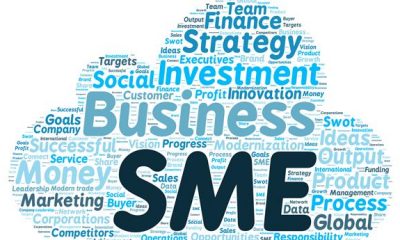Business
The inflation rate in Nigeria on an all-time high
Inflation is a rise in the price levels in relation to goods available leading to endless fall in an economy’s purchasing power over a period of time. It measures the proportion of the rate at which the normal price level of goods and services rise over time in an economy. Nigeria has been experiencing increased levels of inflation since the pandemic broke.
The world is currently fighting COVID-19 that has greatly affected many countries and the world at large, that has measures put in place to suppress the virus. Not only did these measures help curb the spread of the novel virus, but it has also reduced the performance of many economies, businesses and health systems of countries. Currently, more than 3,000,000 people got infected worldwide, with almost over 220,414 people dead. 44 people died in Nigeria from the virus with 255 recoveries. This has had a drastic effect on Nigeria’s economy, which saw its peak in March when the first case was recorded. In March, the CPI recorded a 0.84% rise in month-on-month inflation rate in Nigeria, which was a 0.5% increase from the previous month.
The inflation rate in Nigeria has continually been on an increase from month-on-month and year-on-year rates and several financial experts in Nigeria express their concerns about it and are calling for the currency’s stabilization. A majority of forex traders are particularly unaware about the state of the currency at a given period of time, especially beginners who rely on their brokers to update them on events plaguing the markets. The issues with FX broker comparison is that some brokers are more analytical than others when it comes to delivering information to their customers. While some brokers would prefer analyzing news before delivering it to a beginner trader, others just send out the news to their clients, without ensuring that the implications of the news are fully understood.
The average change in the percentage in both rural and urban areas in CPI of one year, ending in March 2020, over the CPI for the previous year till March 2019 was 11.62%. This shows a 0.08 increase rate of over 11.54% recorded in February 2020 for the same average.
In March 2020, the inflation rate in urban regions increased by 12.93% YoY; which was a 0.08 increase rate from 12.85% YoY change recorded in February 2020. With regards to the MoM rate, urban regions list increased by 0.88%, which is a 0.06 increase rate point from 0.82% recorded in earlier months.
This MoM development is generally caused by the prices of food to other consumer goods. Additionally, in March 2020, the inflation rate in the rural areas also increased by 0.03%, highlighting 11.64% from 11.61% in February 2020, which significantly contributed to the index prices of food. Simultaneously, there was a 0.80% increase in indices, at an additional 0.04 rate point from the 0.76% increase recorded earlier that month.
Statistics show that there was a rise in food prices that were brought about by an increase in costs of Potatoes, sweet potato, yams, fish, oils and fats, meat, fruits, bread and oats, and vegetables. There is currently volatility in the prices of all agricultural products, with the inflation rate steady at 9.98%, which is a 0.25% increase compared to the 9.73% recorded in March.
The highest inflation levels in Nigeria were recorded in bicycle prices, passenger transportation by sea and rates increased, medical services, medication, health services in general, and Major family equipment whether electronic or not. The most recent report suggests a quick rise in the prices of all products and services in the country, which was caused by the COVID-19 pandemic lockdown and the continuation of the pandemic. It is worth noting that the most recent inflation rate implies that the buying capacity of customers has decreased.
On Tuesday morning, Nigeria’s Consumer Prices Index, also known as inflation massively increased in August 2020, by 13.22% as per information delivered by the National Bureau of Statistics. This indicates the twelfth continuous rise since September 2019 and the most noteworthy in 28 months reported by a business examination shows that information from the NBS August 2020 expansion.
Business
Tinubu’s RHI Doles Out N50m To 1,000 Kwara Petty Traders

Business
UBA To Educate SMEs, Business Owners On Withholding Tax

Business
Nigeria Losing $40b Annually From Maritime Sector – NIMENA
-

 Featured5 days ago
Featured5 days agoI Won’t Allow Spoils Of Office To Change Me – Fubara …As Rivers People Mark Gov’s 50th Birthday With Prayers
-
Business5 days ago
Nigeria Losing $40b Annually From Maritime Sector – NIMENA
-
Business5 days ago
Expert identifies UNICEEF’s NLP As Spring Board To AI In Benue
-

 Niger Delta5 days ago
Niger Delta5 days agoCommissioner Hails RSHA Speaker Over Promise Of Constituency Projects To Ogu/Bolo
-
Politics5 days ago
Presidency, APC React As El-Rufai Criticises Party, Urges United Opposition
-

 Niger Delta5 days ago
Niger Delta5 days agoNDDC’s Performance, Boost To Tinubu’s Government – Coalition
-
Politics5 days ago
Same Faith Ticket, CAN Yet To Decide For 2027
-

 Business5 days ago
Business5 days agoUBA To Educate SMEs, Business Owners On Withholding Tax

